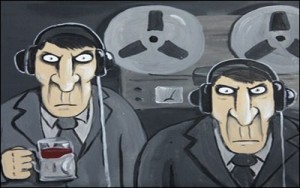In Russia, take control of encrypted Internet traffic
The state is on the verge of violating the constitutional right of citizens to communication secrets
 The National Anti-Terrorism Committee of Russia (NAC) on behalf of the Security Council of the Russian Federation created a working group to discuss the regulation of encrypted traffic. It was headed personally by the head of Roskomnadzor, Alexander Zharov.
The National Anti-Terrorism Committee of Russia (NAC) on behalf of the Security Council of the Russian Federation created a working group to discuss the regulation of encrypted traffic. It was headed personally by the head of Roskomnadzor, Alexander Zharov.The working group included representatives of all security agencies, the Ministry of Economic Development, the Ministry of Telecommunications and industry experts from the Russian Association of Electronic Communications (RAEC). These specialists should prepare their recommendations for regulating encrypted traffic on the Internet and submit their recommendations to the Security Council by July 1, 2016.
According to Roskomnadzor , the share of encrypted traffic in Russia in 2015 was about 15%, and in 2016 it can exceed 20% (According to Rostelecom, the share of encrypted traffic in its network is about 50%). This threatens the state’s ability to effectively control communications on the Web.
Of particular concern to regulators is the end-to-end encryption of instant messengers, who also refuse to install SORM equipment on their servers and cooperate with the FSB. “Messengers work on the same commercial“ glade ”as traditional telecom operators. But they are absolutely "piracy" way "eat off" their audience. You can call it unfair competition. Nobody talks about reading the correspondence of citizens in messengers, but the rules of existence in Russia must be worked out for them, ” said Alexander Zharov in February.
')
In addition, the working group is “working on the issue” of working with anonymizers and Tor. "We are talking about encrypted traffic, whose role is growing, about traffic compression, both legal, which is used in browsers and other programs, [and illegal] in other self-made methods of bypassing blocking: proxy servers, anonymizer, etc.", - said Zharov.
He mentioned the need to introduce some kind of "unified encryption system in order to understand what is happening inside encrypted traffic."
The working group will propose measures that “can be done with various encryption tools that are used: certify them, license them, limit the number of encryption schemes”. A certain German company has already submitted to the working group a system “by analogy with the deep filtering of DPI packets”, but only “at the level of encrypted traffic.”
In addition, Zharov mentioned the threat of P2P messengers on a mesh network like FireChat , which can exchange messages directly, without the Internet. Such applications, in particular, were used to communicate with demonstrators during political unrest in Hong Kong: “In fact, there is an exchange of information packages outside the site network. This is a problem, because in this way drugs will be sold, child pornography will be distributed, and so on. We also need to do something with this, ”said Zharov.
Independent experts look doubtfully at the initiative of the NAC: “The very question of controlling encryption on communication networks is on the verge of violating the constitutional right of citizens to a communication secret,” said a source at one of the telecom operators in a comment to RBC.
The National Anti-Terrorism Committee is a collegiate body that coordinates and organizes anti-terrorism activities of state authorities at the federal level, at the level of the subjects of the Russian Federation and local governments. Formed on February 15, 2006. The committee is chaired by the director of the FSB.
Source: https://habr.com/ru/post/357050/
All Articles